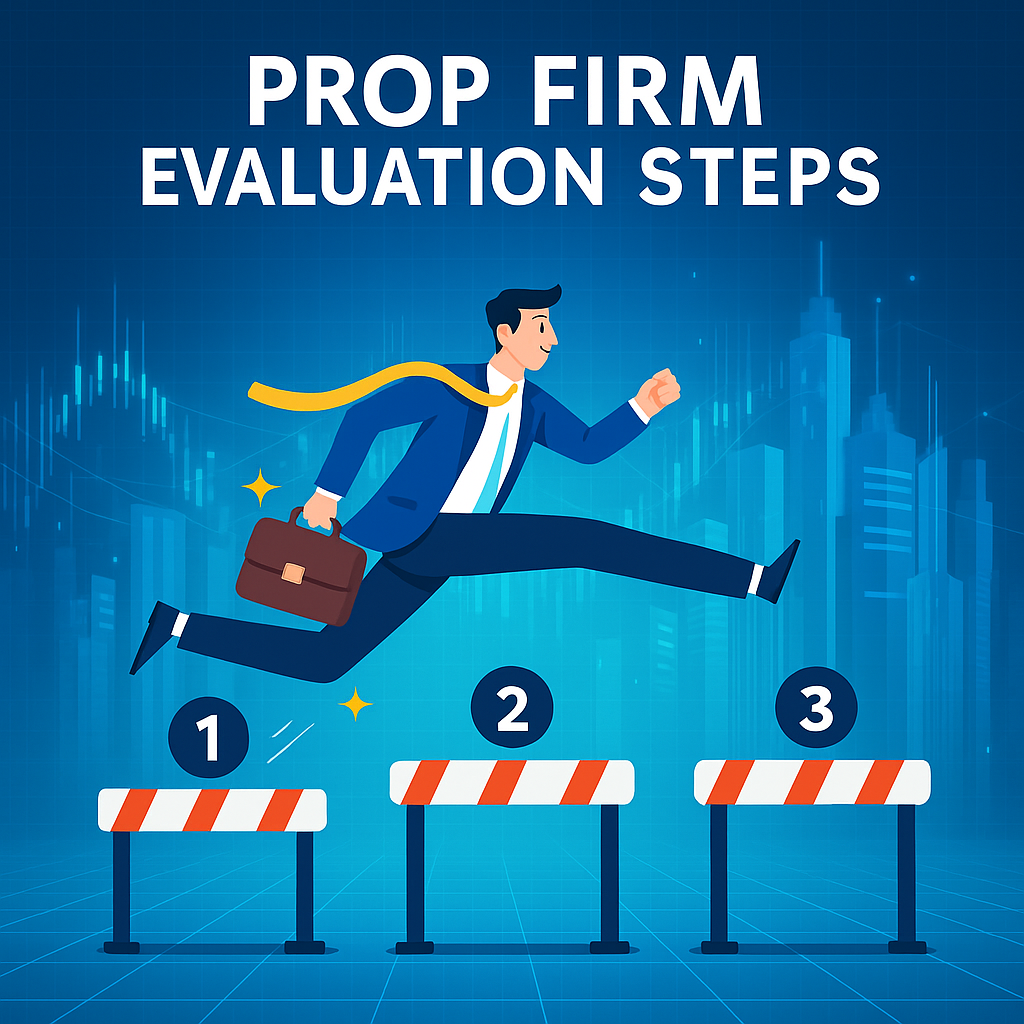7 Steps in the Prop Firm Evaluation Process
The path to becoming a successful proprietary trader begins with mastering the prop firm evaluation steps. These steps serve as a structured journey that allows traders to demonstrate their skills, discipline, and strategy consistency. While it may seem overwhelming at first, understanding each phase can help traders navigate the process with confidence and clarity.
In this article, we’ll break down the entire evaluation process into 7 actionable steps—each of which plays a critical role in determining whether you earn funding or not. If you’re planning to start your journey with a trusted prop firm like Larsa Capital, this guide is designed to set you up for success.
1. Understanding the Evaluation Structure
Every prop firm has a distinct evaluation model, but most follow a two-phase challenge or verification format. In the first phase, traders are usually required to achieve a specific profit target within a set number of days, all while respecting strict risk parameters. The second phase focuses more on consistency and risk management, often with a lower target but similar rules.
Knowing what the structure entails allows traders to prepare psychologically and technically. It’s not just about hitting numbers—it’s about showing consistent, smart trading habits.
2. Reviewing the Rules and Objectives
Before you place a single trade, it’s crucial to study the evaluation rules in detail. These rules typically include:
-
Maximum daily and overall drawdown
-
Profit target percentages
-
Allowed trading hours and instruments
-
Weekend or overnight holding limitations
-
Use of expert advisors or copying tools
Traders who ignore these rules—intentionally or by mistake—often fail, even if they are profitable. Make sure to clarify all conditions with the firm’s documentation or support before starting.
3. Building a Personalized Trading Plan
No trader should approach the evaluation phase without a well-defined trading plan. This step is where preparation meets discipline. Your plan should cover:
-
Daily risk allocation
-
Preferred trading pairs or assets
-
Strategy for entries, exits, and stop losses
-
Rules for compounding or scaling positions
-
Contingency steps for drawdown recovery
Having a written plan reduces emotional decision-making and helps maintain consistency across trades. Successful traders treat the evaluation like a business, not a gamble.
4. Strengthening Mental Discipline During the Evaluation
One of the most crucial factors affecting your success in a prop firm evaluation is your mental discipline. These challenges don’t only test your technical skills — they also measure your ability to make consistent decisions under psychological pressure.
During the evaluation, you will encounter stressful moments, especially after a losing streak or a big win. This is when the real test begins. To stay in control:
-
Check in on your emotional state before each trading session
-
Avoid trading when feeling anxious, angry, or overly confident
-
Take scheduled breaks to maintain mental clarity
-
Remind yourself that the goal is not just to pass — it’s to stay consistent
Psychological control is a pillar of success in the prop firm evaluation steps, and its importance only grows once you move to a funded account.
5. Executing with Precision and Discipline
Execution is where all your preparation comes into play. At this stage, you’ll need to:
-
Stick strictly to your trading plan
-
Track your daily and overall drawdowns
-
Avoid overtrading and revenge trading
-
Log your trades and reflect on each session
Remember, one or two mistakes can cost you the entire evaluation. However, precision doesn’t mean perfection—it means staying calm, methodical, and patient.
6. Monitoring Performance and Adjusting
While consistency is important, so is adaptability. You’ll need to monitor your performance using real-time analytics and adjust your strategy if needed—without breaking your own rules.
Ask yourself questions like:
-
Am I respecting my risk parameters every day?
-
Are there specific sessions or pairs where I consistently win or lose?
-
What trades have deviated from my plan, and why?
By tracking your performance objectively, you develop trader maturity and improve your decision-making over time.
7. Passing the Evaluation and Preparing for a Funded Account
Once you’ve successfully completed both phases of the evaluation, you’ll transition into a funded account. But passing the evaluation is just the beginning. The habits, discipline, and strategy that helped you succeed must continue when real capital is involved.
Firms like Larsa Capital emphasize long-term sustainability over short-term performance. That’s why it’s essential to keep your psychology in check and treat the funded account with even more seriousness than the evaluation itself.
Why Mastering Prop Firm Evaluation Steps Matters
Mastering the prop firm evaluation steps is more than just a checklist—it’s a reflection of your readiness to manage real capital responsibly. Traders who understand and respect each phase of the process are not only more likely to pass but also to thrive in the long run.
These seven steps form the foundation of a successful evaluation journey. Whether you’re just starting out or preparing for your next challenge, applying them systematically will increase your chances of earning a funded trading account and maintaining it for the long haul.
Final Thoughts
Succeeding in a prop firm evaluation is not about luck—it’s about preparation, consistency, and discipline. By following these structured steps and choosing a reliable firm like Larsa Capital, traders put themselves in the best position to succeed. Stay focused, follow your plan, and let each step guide you toward your trading goals.

